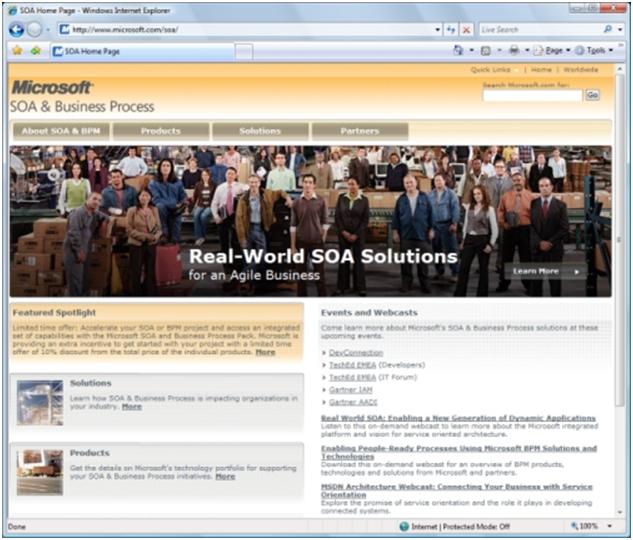Microsoft launches new SOA Website
The new Microsoft SOA & Business Process website is up! And I am really pleased to see it.

Mea culpa time: For a long time, we (Microsoft) have not effectively communicated with customers and partners about Service Oriented Architecture. That's why I'm so pleased to see this new website.
By the way, the new website is up on this, the first day of the 2007 SOA & Business Process conference, happening on Microsoft's campus right now. I'm sitting in the keynote address as I type this. The event is sold out! There are 1000 people here to learn about the Real-World approach to SOA that is enabled by the Microsoft application platform.
Why were we so bad at communicating? Have a look back. As SOA became a theme that captured the imagination of people, Microsoft got leery. Other companies started slapping SOA badges on their existing products: "New! Now SOA enabled!" Some companies started producing new products targeted to SOA. Companies built SOA centers of excellence, SOA Swat teams. The attention around SOA grew and grew. SOA became the solution for everything. SOA was the solution to world hunger!
Side note: Later came the backlash. People started realizing, hey, maybe we're over-doing this SOA thing. People want to get more pragmatic on SOA, they want less pie-in-the-sky promise and more practical results. That's a natural, and maybe a necessary, part of the cycle I guess.
Microsoft, for its part, conceived SOA in a technical context, and the way we talked about SOA showed this. We articulated the four tenets of SOA: Boundaries are explicit, services are autonomous, Services share schema and contract, and Service compatibility is negotiated and based on policy (link). Yikes! This is SOA for bit-heads. This is not actually SOA at all! It is how to build web services.
This tech-heavy focus was our error. Certainly we wanted to educate people on how to build services. But that wasn't the only issue around Service Orientation, and maybe wasn't even the most important issue around Service Orientation. Really, SOA was interesting to businesses because of flexibility and agility. SOA had the potential to bring flexibility to a business, and that meant better competitive positioning. We were talking about service contracts and WSDLs, while customers were talking about getting their work done more quickly, or being more responsive to market shifts. We whiffed on this.
But we've seen the error of our ways! SOA remains an important theme for the industry, a key opportunity for customers. And We, Microsoft, have slowly but steadily evolved and matured and broadened our thinking on SOA, and that's a Good Thing. The new SOA website is good evidence of this. It's meant to provide a single point of access for our customers into our SOA thinking, a single place where we talk about the capabilities across the entire Microsoft application platform product set - across Visual Studio, System Center, the .NET Framework, SharePoint Server, BizTalk Server, and more - and how those pieces fit into a SOA strategy. It also provides a place for Microsoft to communicate about SOA-related events, partner activities and offerings, and other content related to SOA that is available throughout the Microsoft.com web.
Comments
Anonymous
October 30, 2007
PingBack from http://styleicio.us/blog/uncategorized/microsoft-launches-new-soa-website/Anonymous
October 30, 2007
Did you see this post at blogs.msdn.comAnonymous
October 30, 2007
You didn't mess up. It was correct of you to make your case for SOA on the technical merits. Any fool can can claim his product increases productivity or improves return on investment. Who in their right mind is going to claim otherwise? An IT manager has to decide whether to believe such a sales pitch. For this the manager must be technically competent enough to evaluate the product or design pattern on its technical merits. The manager must understand how the product or pattern functions and why this could lead to decreased development time or support costs or whatever else is promised by the marketing hype. I am sorry that technical knowledge is required to make a good decision here, but that's how it is. We can tell ourselves that science can be understood without math, but that's just a way to cop out of the rigorous thinking required by math. Same principle applies here in IT. So, this isn't much of an annoucement in my opinion. This just shows that while a crowd often follows hype it will also follow profit. The SOA gurus have demonstrated their brainy ideas actually work and are profitable. So the crowd is demanding that SOA be explained to them without all the math. We should oblige them, but let's not pretend this is any kind of revolutionary annoucement.